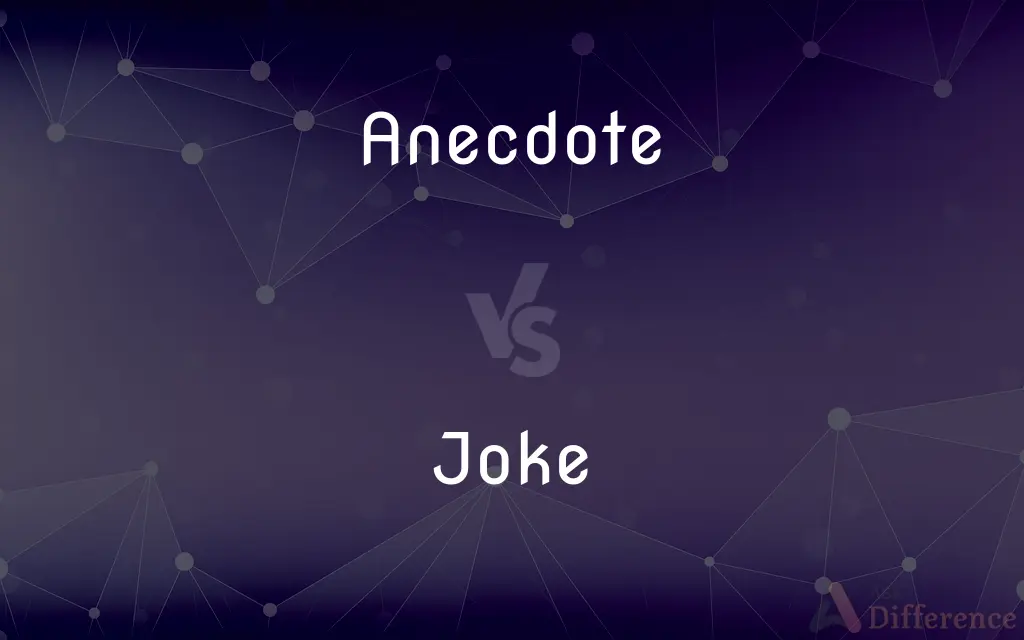Anecdote vs. Joke — What's the Difference?
By Maham Liaqat & Urooj Arif — Updated on March 18, 2024
An anecdote is a brief, often amusing story about a real incident or person, rich in detail and context, while a joke is a short narrative or statement designed to provoke laughter, focusing on humor and punchlines.

Difference Between Anecdote and Joke
Table of Contents
ADVERTISEMENT
Key Differences
An anecdote is typically a short narrative about an interesting or amusing real-life incident, often intended to illustrate a point or reveal a truth about a person or situation. It relies on the context and the uniqueness of the experience, whereas a joke is crafted for the sole purpose of eliciting laughter, often using exaggeration, wordplay, or a surprising twist in its delivery.
While anecdotes are based on real events or personal experiences, lending them authenticity and a touch of reality, jokes are fictional constructs designed to amuse, often lacking in detail about time, place, or the characters involved. Anecdotes can serve various purposes, such as to entertain, share insights, or underscore a lesson, whereas jokes primarily aim to entertain through humor.
Anecdotes often involve relatable situations or experiences, allowing the listener to connect with the story on a personal level. This relatability can evoke a range of emotions, from amusement to empathy, whereas jokes, especially those structured as one-liners or with a set-up and punchline, seek a quick laugh, sometimes at the expense of depth or realism.
The delivery of an anecdote usually depends on the storyteller's ability to convey the subtleties of the situation, the personalities involved, and the context, making timing and detail crucial. On the other hand, the success of a joke often hinges on the element of surprise, timing, and the punchline, with less emphasis on the narrative's authenticity or complexity.
Both anecdotes and jokes play significant roles in communication and social interactions, albeit serving different purposes. Anecdotes can deepen conversations and foster connections through shared experiences or insights, while jokes can lighten the mood, break the ice, and bring laughter to a group, enhancing social bonding in a more immediate and lighthearted manner.
ADVERTISEMENT
Comparison Chart
Nature
Short story about a real incident or person.
A narrative or statement designed to provoke laughter.
Basis
Real events or personal experiences.
Fictional or exaggerated scenarios.
Purpose
To entertain, illustrate a point, or share insight.
Primarily to entertain through humor.
Emphasis
Context, detail, and authenticity.
Humor, wordplay, and punchlines.
Emotional Response
Can evoke a range of emotions.
Aimed at eliciting laughter.
Delivery
Relies on storytelling ability and context.
Depends on timing and the surprise element of the punchline.
Role in Social Interactions
Can deepen conversations and connections.
Lightens the mood and enhances bonding through laughter.
Compare with Definitions
Anecdote
Personal story with a lesson.
The anecdote about her childhood mistake taught us the value of honesty.
Joke
Often involves exaggeration.
The joke exaggerated the situation to comic effect.
Anecdote
Real-life incident.
His anecdote from the trip perfectly captured the local culture.
Joke
Intended to provoke laughter.
His ability to tell a joke always lightens the mood.
Anecdote
Can be humorous or insightful.
She shared a humorous anecdote that also made us think.
Joke
May include a punchline.
The punchline of the joke took us by surprise.
Anecdote
Often contains specific details.
The anecdote included the exact words spoken during the event.
Joke
Designed for humor.
The joke about the talking dog had everyone laughing.
Anecdote
Enhances narratives with authenticity.
The speaker's anecdote added a personal touch to his presentation.
Joke
Can be a one-liner or a short story.
The one-liner joke was quick but effective.
Anecdote
An anecdote is a brief, revealing account of an individual person or an incident: "a story with a point," such as to communicate an abstract idea about a person, place, or thing through the concrete details of a short narrative or to characterize by delineating a specific quirk or trait. Occasionally humorous, anecdotes differ from jokes because their primary purpose is not simply to provoke laughter but to reveal a truth more general than the brief tale itself.Anecdotes may be real or fictional; the anecdotal digression is a common feature of literary works and even oral anecdotes typically involve subtle exaggeration and dramatic shape designed to entertain the listener.
Joke
A joke is a display of humour in which words are used within a specific and well-defined narrative structure to make people laugh and is usually not meant to be taken seriously. It takes the form of a story, usually with dialogue, and ends in a punch line.
Anecdote
A short amusing or interesting story about a real incident or person
He told anecdotes about his job
Joke
Something said or done to evoke laughter or amusement, especially an amusing story with a punch line.
Anecdote
A short account of an interesting or humorous incident.
Joke
A mischievous trick; a prank
Played a joke on his roommate.
Anecdote
Pl. an·ec·dotes or an·ec·do·ta (-dōtə) Secret or hitherto undivulged particulars of history or biography.
Joke
Something that is of ludicrously poor quality
Their delivery service is a joke.
Anecdote
A short account of a real incident or person, often humorous or interesting.
Tell an anecdote
Relate a short anecdote
Joke
Something not to be taken seriously; a triviality
The accident was no joke.
Anecdote
An account which supports an argument, but which is not supported by scientific or statistical analysis.
Joke
An object of amusement or laughter; a laughingstock
His loud tie was the joke of the office.
Anecdote
A previously untold secret account of an incident.
Joke
To tell or play jokes; jest.
Anecdote
(ambitransitive) To tell anecdotes (about).
Joke
To speak in fun; be facetious
You have to be joking.
Anecdote
Unpublished narratives.
Joke
To say or write as a joke.
Anecdote
A particular or detached incident or fact of an interesting nature; a biographical incident or fragment; a single passage of private life.
Joke
An amusing story.
Anecdote
Short account of an incident (especially a biographical one)
Joke
Something said or done for amusement, not in seriousness.
It was a joke!
Joke
(figuratively) The root cause or main issue, especially an unexpected one
Joke
(figuratively) A laughably worthless thing or person; a sham.
Your effort at cleaning your room is a joke.
The president was a joke.
Joke
(figuratively) Something that is far easier or far less challenging than expected.
The final exam was a joke.
Joke
(intransitive) To do or say something for amusement rather than seriously.
I didn’t mean what I said — I was only joking.
Joke
(intransitive, followed by with) To dupe in a friendly manner for amusement; to mess with, play with.
Relax, man, I'm just joking with you.
Joke
To make merry with; to make jokes upon; to rally.
To joke a comrade
Joke
Something said for the sake of exciting a laugh; something witty or sportive (commonly indicating more of hilarity or humor than jest); a jest; a witticism; as, to crack good-natured jokes.
And gentle dullness ever loves a joke.
Or witty joke our airy senses movesTo pleasant laughter.
Joke
Something not said seriously, or not actually meant; something done in sport.
Inclose whole downs in walls, 't is all a joke.
Joke
To make merry with; to make jokes upon; to rally; to banter; as, to joke a comrade.
Joke
To do something for sport, or as a joke; to be merry in words or actions; to jest.
He laughed, shouted, joked, and swore.
Joke
A humorous anecdote or remark intended to provoke laughter;
He told a very funny joke
He knows a million gags
Thanks for the laugh
He laughed unpleasantly at hisown jest
Even a schoolboy's jape is supposed to have some ascertainable point
Joke
Activity characterized by good humor
Joke
A ludicrous or grotesque act done for fun and amusement
Joke
A triviality not to be taken seriously;
I regarded his campaign for mayor as a joke
Joke
Tell a joke; speak humorously;
He often jokes even when he appears serious
Joke
Act in a funny or teasing way
Common Curiosities
Can an anecdote be humorous?
Yes, anecdotes can be humorous, though their humor often stems from the reality of the situation or the peculiarities of the characters involved, rather than constructed punchlines.
Is a joke always fictional?
While jokes often involve fictional scenarios or exaggeration for comedic effect, they can also be based on real situations but altered for humor.
What role does timing play in telling a joke?
Timing is crucial in telling a joke, especially in delivering the punchline, to maximize the comedic effect and ensure the audience's laughter.
What is an anecdote?
An anecdote is a brief story about a real incident or person, often humorous or interesting, used to illustrate a point or share an insight.
Why are jokes important in social interactions?
Jokes are important in social interactions as they can break the ice, lighten the mood, and bring people together through shared laughter, enhancing social bonds.
How does a joke differ from an anecdote?
A joke is a short narrative or statement crafted to elicit laughter, often through humor, wordplay, or a punchline, while an anecdote is a real-life story shared to entertain, convey insights, or illustrate a point.
How important are details in an anecdote?
Details are crucial in anecdotes as they add authenticity, help set the scene, and make the story more relatable and engaging for the audience.
Are anecdotes always true?
Anecdotes are based on real events or personal experiences, but they may be embellished or altered slightly for effect when being retold.
Can anecdotes serve a purpose other than entertainment?
Anecdotes can serve multiple purposes, including illustrating a point, sharing valuable insights, or highlighting a personal or moral lesson, beyond mere entertainment.
How do cultural differences affect anecdotes and jokes?
Cultural differences can significantly impact the content, delivery, and reception of anecdotes and jokes, as humor and storytelling styles vary widely across cultures.
What makes a good anecdote?
A good anecdote is engaging, relatable, and well-told, with enough detail to set the scene and a point or insight that resonates with the audience.
Can a joke be part of an anecdote?
Yes, a joke can be part of an anecdote, especially if the real-life story involves a humorous situation or a funny exchange between the characters.
How do anecdotes and jokes contribute to storytelling?
Anecdotes add depth and authenticity to storytelling by sharing real experiences, while jokes inject humor, making stories more engaging and entertaining.
Can the same story be both an anecdote and a joke?
A story can start as an anecdote and be retold with embellishments or a punchline as a joke, but its classification depends on the intent and the content.
Share Your Discovery

Previous Comparison
Stop vs. End
Next Comparison
Catwalk vs. WalkAuthor Spotlight
Written by
Maham LiaqatCo-written by
Urooj ArifUrooj is a skilled content writer at Ask Difference, known for her exceptional ability to simplify complex topics into engaging and informative content. With a passion for research and a flair for clear, concise writing, she consistently delivers articles that resonate with our diverse audience.
















































